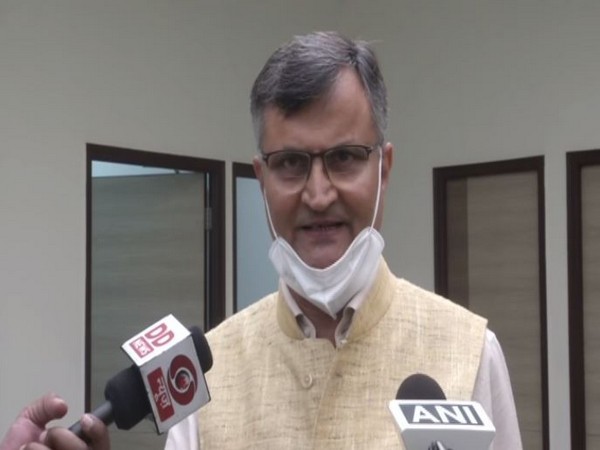Union ministers Rajnath Singh and Narendra Singh Tomar discuss farm laws with agriculture experts
Defence Minister Rajnath Singh and Minister of Agriculture and Farmer Welfare Narendra Singh Tomar on Tuesday held a meeting with agriculture experts over farm laws.

- Country:
- India
By Gaurav Arora Defence Minister Rajnath Singh and Minister of Agriculture and Farmer Welfare Narendra Singh Tomar on Tuesday held a meeting with agriculture experts over farm laws.
Dr Ramesh Chand, Member, Niti Aayog said that as the fruits and vegetables were denotified from Agricultural Produce Market Committee (APMC) in 2013, now the scope has been extended to all other crops and this is the only change that has been made in the Farm Act related to agriculture and marketing, Speaking to reporters here, Chand said, "I will tell you about the three Acts in brief. First is related to agriculture and marketing. In the year 2013, fruits and vegetables were denotified from APMC but now the scope has been extended to all other crops this is the only change made in the Act. You must have seen that despite taking fruits and vegetables out of APMC, they are still being sold in the same quantity as earlier."
"In the second Act, till now the government used to give on Minimum Support Price (MSP) but now the private sector will also give MSP to farmers. The third is the essential commodity act in which new modification has been done. It has not been removed at all," added Chand. He said that transparent criteria have been ensured to impose Essential Commodities Act.
"To impose Essential Commodities Act, transparent criteria have been ensured that if our grain pulses oil price rises by more than 50 per cent from the average of last five years then the government can impose a limit. Earlier the Essential Commodity Act used to be imposed whenever the government wanted but now a criterion has been made for it. Today, the Honorable Defense Minister and Agriculture Minister took a meeting in which the country's experts were called from different parts of the nation for discussion. Today it was the third meeting and everyone shared their experiences," he said. Meanwhile, Sanjeev Chaddha, Managing Director, National Agriculture Marketing said that with these Acts farmers can sell their produce anywhere and one does not need to wait for the Mandi.
"In this season, we bought onions, which had been selling at Rs 5 per kg due to COVID-19. We paid from Rs 9 to 10 which benefited the farmers. Through this act they can also make small mandis and sell them directly and they can give products anywhere without mandi. We are setting up small mandis with help of cooperatives. One small Mandi has been started in Pune and another one has been proposed," Chaddha said. Rakesh Gambhir, Chairman, Global Food and Retail Council said, "I believe that the Government has brought three Acts and the Independence Day for the farmers has come now. This is the beginning of getting freedom from the mandis. We will be able to go to our area and take the right price, we can take the goods of all the retail farmers directly and pay them. This will reduce the exploitation (middleman). It will be good for the farmers of the country."
Aneesh Jain, Director Gram Utthan Foundation said, "I am working with one and a half lakh farmers in six states. Today our discussion was with Honorable Defense Minister and he was asking what will be the impact on the lives of farmers? Our experience is that this is a very good act." The Farmers' (Empowerment and Protection) Agreement of Price Assurance and Farm Services Act, 2020, the Farmers' Produce Trade and Commerce (Promotion and Facilitation) Act, 2020, and the Essential Commodities (Amendment) Act 2020, were recently passed in the Parliament and enacted after President Ram Nath Kovind gave his assent to the same.
Meanwhile, several protests are being held at places across the country by the opposition parties against the farm laws, which they claim are against the interests of the farmers. As per the government, the new law intends to provide a national framework for the farming agreements to protect and empower farmers as they engage with agri-business and food processing firms, wholesalers, exporters and large retailers for farm services and sale of produce at a remunerative price framework in a fair and transparent manner. (ANI)
(This story has not been edited by Devdiscourse staff and is auto-generated from a syndicated feed.)
- READ MORE ON:
- Ramesh Chand
- Ram Nath
- Rajnath Singh
- Chaddha
- Narendra Singh Tomar
- Niti Aayog
ALSO READ
"After elections, SP and Congress will become Samapt Party and Kaun Congress...": Rajnath Singh
BJP changed public perception towards politicians, politics: Rajnath Singh
"Entire UP is completely angry": Rajnath Singh attacks SP, Congress over their narratives against BJP
BJP changed public perception towards politicians, politics: Rajnath Singh
BJP changed public perception towards politicians, politics: Rajnath Singh










